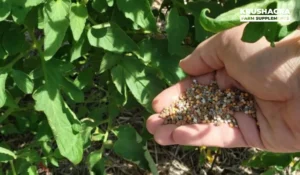Introduction
In the world of agriculture, pests pose a significant threat to crop health and yield. Among these pests, nematodes stand out as particularly destructive organisms that can cause substantial damage to various crops. Traditional chemical pesticides have been the go-to solution for nematode control, but their negative impacts on the environment and human health have raised concerns. As a result, the use of biopesticides has gained momentum in recent years. In this blog post, we will explore the benefits of using biopesticides for nematode control in different crops, highlighting their efficacy, safety, environmental friendliness, and sustainability.
Enhanced Efficacy
Biopesticides, derived from naturally occurring substances such as plants, bacteria, and fungi, have shown remarkable efficacy in controlling nematodes. They offer a viable alternative to conventional chemical pesticides, as they target specific pests while sparing beneficial organisms. Biopesticides exhibit various mechanisms of action, including direct toxicity, parasitism, and induction of plant defenses, which effectively disrupt nematode life cycles and reduce their populations.
One example of a potent biopesticide is Bacillus thuringiensis (Bt), a soil bacterium. Bt produces crystal proteins that are toxic to specific nematodes. When applied as a biopesticide, Bt selectively targets nematodes while leaving other soil organisms unharmed. This specificity ensures efficient nematode control without the collateral damage associated with chemical pesticides.
Safety for Humans and Animals
Unlike chemical pesticides, biopesticides are generally considered safe for humans, animals, and the environment. Chemical pesticides can have adverse effects on human health, including respiratory problems, allergic reactions, and even long-term chronic illnesses. Additionally, these compounds can persist in soil and water, contaminating the ecosystem and posing risks to wildlife.
Biopesticides, on the other hand, have a favorable safety profile. They are often biodegradable, minimizing the accumulation of harmful residues in the environment. This characteristic ensures the protection of farm workers, consumers, and wildlife from potential pesticide exposure. Moreover, the use of biopesticides allows for reduced pre-harvest intervals, enabling farmers to harvest their crops sooner after application, ensuring a safer food supply.
Environmental Friendliness
Protecting the environment is a crucial aspect of sustainable agriculture. Chemical pesticides can have detrimental effects on ecosystems, including the contamination of water bodies and the loss of beneficial organisms. In contrast, biopesticides offer a more environmentally friendly solution for nematode control.
Biopesticides are typically derived from natural sources and often break down rapidly, resulting in reduced environmental persistence. This characteristic minimizes the risk of contaminating soil, water, and air. Additionally, biopesticides are target-specific, which means they affect only the intended pests, leaving non-target organisms unharmed. This precision reduces the ecological disruption caused by broad-spectrum chemical pesticides, preserving biodiversity and promoting overall ecosystem health.
Compatibility with Integrated Pest Management (IPM) Practices
Biopesticides align seamlessly with Integrated Pest Management (IPM) practices, which aim to minimize pest damage while minimizing the use of chemical pesticides. IPM combines various pest control strategies, including biological control, cultural practices, and chemical interventions when necessary. Biopesticides serve as an essential component of IPM, as they contribute to the sustainable management of nematode populations.
By integrating biopesticides into IPM programs, farmers can reduce their reliance on chemical pesticides and promote the use of environmentally friendly alternatives. Biopesticides, in conjunction with other IPM strategies, provide a comprehensive and long-term solution for nematode control, ensuring the sustainability of crop production systems.
Resistance Management
Pestic Resistance development is a significant concern when using chemical pesticides for pest control. Nematodes, like other pests, can develop resistance to chemical treatments over time, rendering them ineffective. This necessitates the constant development and use of new, more potent chemical pesticides, leading to a never-ending cycle.
Biopesticides, however, offer a different approach to resistance management. The use of biopesticides with multiple modes of action can help mitigate the development of resistance in nematode populations. Since biopesticides often target specific biological processes or interactions within the nematodes, they provide fewer opportunities for the pests to develop resistance.
Additionally, biopesticides can be used in rotation or combination with other pest management strategies, including chemical pesticides, cultural practices, and crop rotation. This integrated approach helps reduce the selection pressure on nematodes, making it more difficult for resistance to develop.
Sustainable Agriculture
Sustainability is a key consideration in modern agriculture. With the growing global population and the need to produce more food, it is crucial to adopt practices that minimize the negative impacts of farming on the environment and human health. Biopesticides play a vital role in promoting sustainable agriculture.
The use of biopesticides for nematode control aligns with sustainable farming principles by reducing the dependence on chemical pesticides. Biopesticides offer a targeted and environmentally friendly solution that supports ecosystem balance and biodiversity. They contribute to the preservation of soil health, water quality, and overall ecosystem resilience.
Moreover, biopesticides can be integrated into organic farming systems, providing an effective and natural approach to pest management. Organic farmers rely heavily on biopesticides and other biological control methods to maintain the integrity of their organic certification while effectively managing nematode populations.
Conclusion
Biopesticides offer numerous benefits for nematode control in different crops. Their enhanced efficacy, safety for humans and animals, environmental friendliness, compatibility with Integrated Pest Management (IPM) practices, resistance management capabilities, and contribution to sustainable agriculture make them an attractive alternative to chemical pesticides.
As agriculture continues to evolve towards more sustainable and environmentally conscious practices, biopesticides are gaining recognition as essential tools for nematode control. By harnessing the power of nature, farmers can effectively manage nematode populations while minimizing the negative impacts on the environment, human health, and beneficial organisms.
Moving forward, further research and development efforts should focus on expanding the range of biopesticides available, improving their formulations and application methods, and educating farmers about their benefits and proper use. By embracing biopesticides as a valuable tool in nematode management, we can foster a more sustainable and resilient agricultural system for the future.






